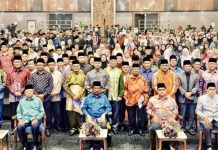KOTA KINABALU, The Federation of Chinese Associations Sabah (FCAS) is of the opinion that that the increase in minimum wage, from RM1,500 to RM1,700 per month, starting February next year, which was announced in the national budget for the next financial year, should be implemented progressively in East Malaysia, including Sabah, rather than in a one-size-fits-all manner
Its President, Tan Sri T.C Goh pointed out that apart from large enterprises, many small and medium businesses would be adversely impacted by repeated increases in the minimum wage, which would lead to increased production and operational costs for employers.
“If fully implemented, this could result in layoffs, as employers opting to hire on a contractual basis, businesses might even have to cease operations due to losses. This (new round of minimum wage increment) would backfire and potentially increase the unemployment rate,” he warned.
He believes the same issues exist in various states in Malaysia, including the East Coast of Peninsular Malaysia, particularly in the six states classified as “underdeveloped” under the 12th Malaysia Plan (Sabah, Sarawak, Perlis, Kedah, Kelantan, and Terengganu).
“The business environment in these states is not as vibrant as in other regions, making it difficult for many employers to keep up with the government’s wage adjustment policy.
“The implementation (of minimum wage increment) should be based on the local business environment in different states and regions, using a gradual, soft-landing approach,” he suggested.
Goh who is also the President of the Federation of Chinese Associations Malaysia (Huazong) and a member of the Sabah Economic Advisory Council (SEAC), expressed this in a statement today, while further commenting on the 2025 budget presented by Prime Minister cum Finance Minister Datuk Seri Anwar Ibrahim in Parliament yesterday. He emphasized that the federal government should implement the new minimum wage based on local conditions, the size of businesses, and the economic growth and development of each region, rather than applying it across the nation in a ‘one-size-fits-all’ manner.
He pointed out that the market and economic development of East Malaysia, particularly Sabah, including the private sector and especially small, medium and micro businesses, are still far behind many of the more “developed states” in Peninsular Malaysia.
“This is an undeniable fact. Furthermore, the basic infrastructure, including roads, electricity, and water supply in East Malaysia, Sabah in particular, are long neglected by the federal government, and remain in dire need of improvement. Likewise, the standard of living in these areas also needs to be uplifted,” he pointed out.
“This is a closely connected problem i.e. a smaller market makes it harder for businesses to grow, which makes it harder to hire employees or raise salaries,” he elaborated.
Nevertheless, Goh who is also the President of the Federation of Sabah and Labuan Hokkien Associations (FSLHA) expressed relief that Sabah received the highest national allocation in this year’s budget, with development funds seeing another increase.
He noted that Sabah received RM6.7 billion in this budget, a 0.45% increase from the RM6.67 billion allocated this year. He hopes this will ensure the successful completion of infrastructure projects under the 12th Malaysia Plan within the state.
He also welcomed the federal government’s decision to raise Sabah’s special allocation from RM125 million to RM300 million, noting that this would help implement additional development projects within the state.
Meanwhile, he noted that aside from policies aimed at benefiting people and businesses nationwide, the 2025 Budget also caters policies which focused on Sabah. These include:
· The implementation of 17 construction packages under Phase 1B of the Pan Borneo Highway in Sabah, with a total cost of RM9.7 billion.
· Phase two of the Sabah-Sarawak Link Road (SSLR) project, with a total cost of RM7.4 billion, of which two packages have already been awarded. The remaining packages will be awarded by the end of this year, and construction will begin next year.
· RM253 million for two airport expansion projects, including Tawau Airport.
· Over RM200 million to provide air services to rural areas in East Malaysia, including the opening of a new route from Kota Kinabalu to Layang-Layang.
· Special tax incentives for 21 national economic projects, including renewable energy in Sabah.
· The construction of five new secondary schools nationwide, including Lok Kawi Secondary School in Sabah.
· RM1 billion to upgrade facilities at 543 schools nationwide, including those in Sabah.
· Allocation of RM560 million to enhance national border security, including the construction of two new border outposts in Sabah’s Simanggaris and Serudong, as well as the expansion of surveillance using drones and AI technology.
· A RM3 billion national flood mitigation plan, including the Likas River flood mitigation project in Kota Kinabalu, Sabah.
· RM65 million for the irrigation and drainage system development of paddy planting areas in East Malaysia, including those in Sabah.
· The establishment of 11 new welfare and education centers for autistic children nationwide, including one in Sabah.
· RM300 million for the construction of two special education schools, one of which will be in Tuaran, Sabah.
· Expansion of Bank Simpanan Nasional’s mobile banking services to include areas in Sabah.
· RM100 million to expand mobile services in rural areas of East Malaysia, including Pangaraan village in Sabah.
· RM5 million to implement a hybrid rainwater and groundwater system to provide clean water for Sabah’s Eastern Sabah Security Command (ESSCom).
· RM100 million for the construction of stalls and upgrading of markets nationwide, including in Sabah.
· A RM100 increase in the living allowance for students of the Sabah Islamic and Missionary Studies Institute.-pr/BNN






